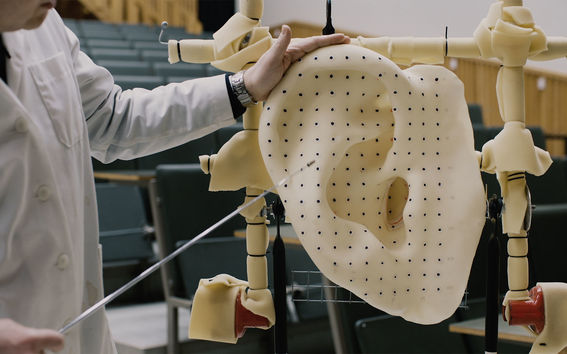How to make something good even better: research cooperation with Genelec has continued for decades

‘Something good can be made even better’, Professor of Audio Signal Processing Vesa Välimäki replies when asked why well-functioning speakers are still being studied and improved through research. Aalto University's research projects have involved, for instance, the automatic calibration technology of studio speakers. It ensures a high quality of sound regardless of the room and its location. The most recent study published in cooperation focuses on improving the impulse response of speakers.
‘We modelled the speaker on the computer, which made it possible to test at what point of time certain frequencies come out of the speaker in relation to each other’, says Juho Liski who is working on a doctoral dissertation on the topic.
Cooperation with several companies
It is natural for the acoustics researchers of Aalto University to cooperate with Genelec, as the company’s roots go back to the Helsinki University of Technology, where the company founder studied in the 1970s. In addition to joint research projects, Genelec cooperates with universities in many different ways. The company's representatives give lectures on different courses and the company provides students with opportunities for diploma work and training.
Aalto University’s acoustics researchers also cooperate with other companies, such as Nokia and Huawei. The Aalto Acoustics Lab, which was established a few years ago, has intensified the cooperation between acoustics researchers, such as increasing joint research and student projects, and the number of funding applications.
Read more about the Aalto Acoustics Lab >>
In the video, Vesa and Juho show how the speaker works and how to carry out research on speakers
Read more news

Apply Now: Unite! Visiting Professorships at TU Graz
TU Graz, Austria, invites experienced postdoctoral researchers to apply for two fully funded visiting professorships. The deadline for expressions of interest is 20 February 2026, and the positions will begin on 1 October 2026.
Hanaholmen’s 50th anniversary exhibition lives on online – making the history of Finnish–Swedish cooperation accessible worldwide
MeMo Institute at Aalto University has produced a virtual 3D version of the anniversary exhibition of Hanaholmen.Soil Laboratory Exhibition – Exploring the Dialogue Between Human and the Earth in Utsjoki
Soil Laboratory explores the relationship between humans and the earth as a living landscape through ceramic practices in Utsjoki.






